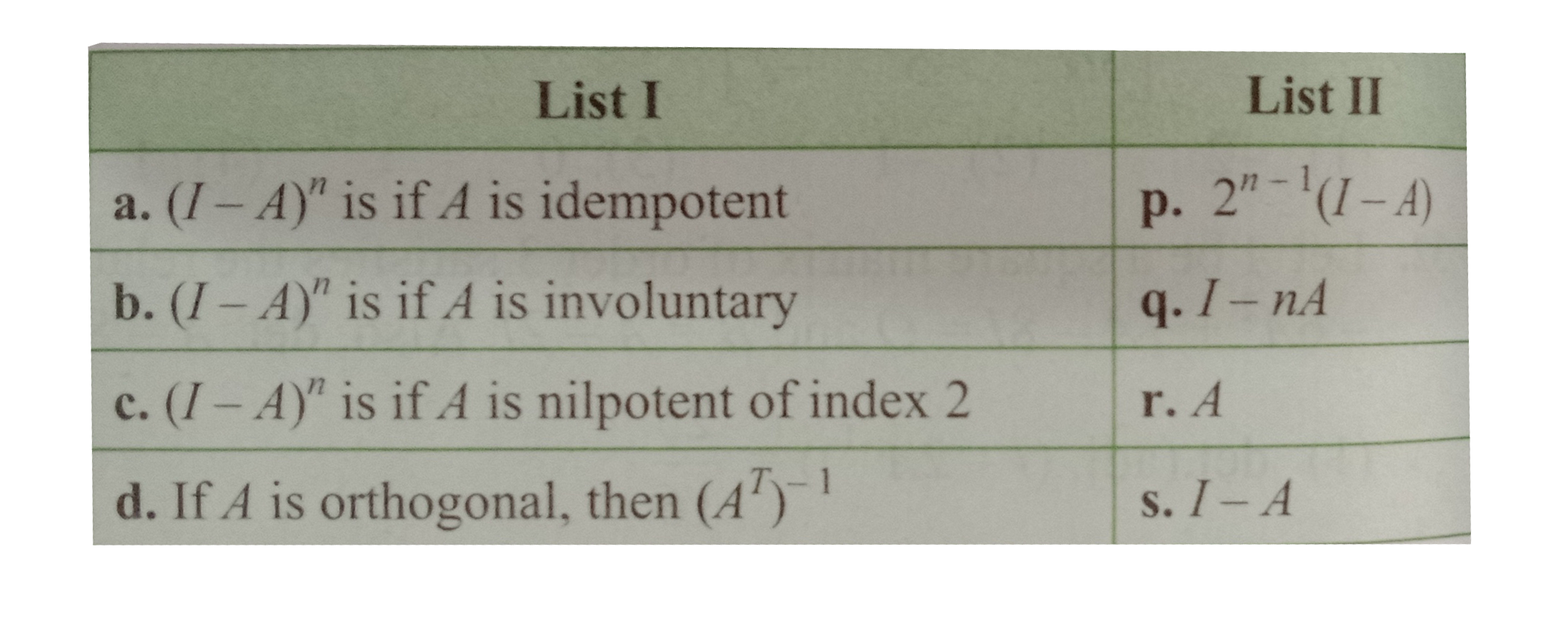A and B are square matrices such that det. (A)=1,BBT=I, det (B)>0, and A(adj.A+adj.B)=B.
The value of det (A+B) is Solution in Tamil
−2
−1
0
1
The correct Answer is:D
BBT=I
∴∣∣BBT∣∣=1
⇒|B|∣∣BT∣∣=1
⇒|B|∣∣BT∣∣=1
⇒|B|=1
A(adj. A + adj. B)=B
⇒|A|I+A×adj B=B
⇒I+A×adj B=B
⇒I×B+A×(adj B)×B=B2
⇒B+A|B|I=B2
⇒B+A=B2 (1)
⇒|A+B|=|B|2=1
Topper's Solved these Questions
- BOOK - CENGAGECHAPTER - MATRICESEXERCISE - Exercise (Matrix)5videos
MATRICES
- BOOK - CENGAGECHAPTER - MATRICESEXERCISE - Exercise (Numerical)24videos
MATRICES
- BOOK - CENGAGECHAPTER - MATRICESEXERCISE - Exercise (Multiple)33videos
MATRICES
- BOOK - CENGAGECHAPTER - MATHMETICAL REASONINGEXERCISE - JEE Previous Year10videos
MATHMETICAL REASONING
- BOOK - CENGAGECHAPTER - METHODS OF DIFFERENTIATIONEXERCISE - Multiple Correct Answer Type7videos
METHODS OF DIFFERENTIATION
Similar Questions
Match the following lists :
 07:20View Solution
07:20View SolutionA=[0130]andA8+A6+A2+IV=[011](whereIis the 2×2 identity matrix), then the product of all elements of matrix V is _____.
02:49View SolutionIf A is unimidular, then which of the following is unimodular ?
02:22View SolutionStatement-1: ~(p↔~q) is equivalent to (p↔q).
Statement-2: ~(p↔~q) is a tautology.02:31View SolutionEvaluate: ∫[√1+x2+x]n√1+x2dx
03:48View SolutionIf A and B are square matrices of order 3 such that det.(A)=-2 and det.(B)=1, then det.(A^(-1)adjB^(-1). adj (2A^(-1)) is equal to
06:35View SolutionA and B are square matrices such that det. (A)=1,BBT=I, det (B)>0, and A(adj.A+adj.B)=B.
The value of det (A+B) is02:35View SolutionA and B are square matrices such that det. (A)=1,BBT=I, det (B)>0, and A( adj. A + adj. B)=B.
AB−1=02:31View SolutionLet A and B are two square matrices of order 3 such that det. (A)=3 and det. (B)=2, then the value of det. ((adj. (B−1A−1))−1) is equal to _______ .
03:56View SolutionIf A and B are non-singular matrices of Q. 1 order 3times3 such that A=(adj B) and B=(adj A) then det(A)+det(B) is equal to
02:09View SolutionLet B be a skew symmetric matrix of order 3×3 with real entries. Given I−B and I+B are non-singular matrices. If A=(I+B)(I−B)−1, where det(A)>0 ,then find the value of det(2A)−det(adj(A)) [Note: det(P) denotes determinant of square matrix P and det(adj(P)) denotes determinant of adjoint of square matrix P respectively.]
01:08View SolutionA and B are square matrices such that det. (A)=1,BBT=I, det (B)>0, and A( adj. A + adj. B)=B.
The value of det (A+B) is10:16View SolutionA and B are square matrices such that det. (A)=1,BBT=I, det (B)>0,B + A= B^(2) and A( adj. A + adj. B)=B.
AB−1=03:14View SolutionLet A and B are two square matrices of order 3 such that det. (A)=3 and det. (B)=2, then the value of det. ((adj. (B−1A−1))−1) is equal to _______ .
04:58View SolutionIf A and B are square matrices of order 2, then det(A+B)=0 is possible only when (a)det(A)=0 or det(B)=0 (b) det(A)+det(B)=0 (c) det(A)=0 and det(B)=0 (d) A+B=O
03:30View Solution

